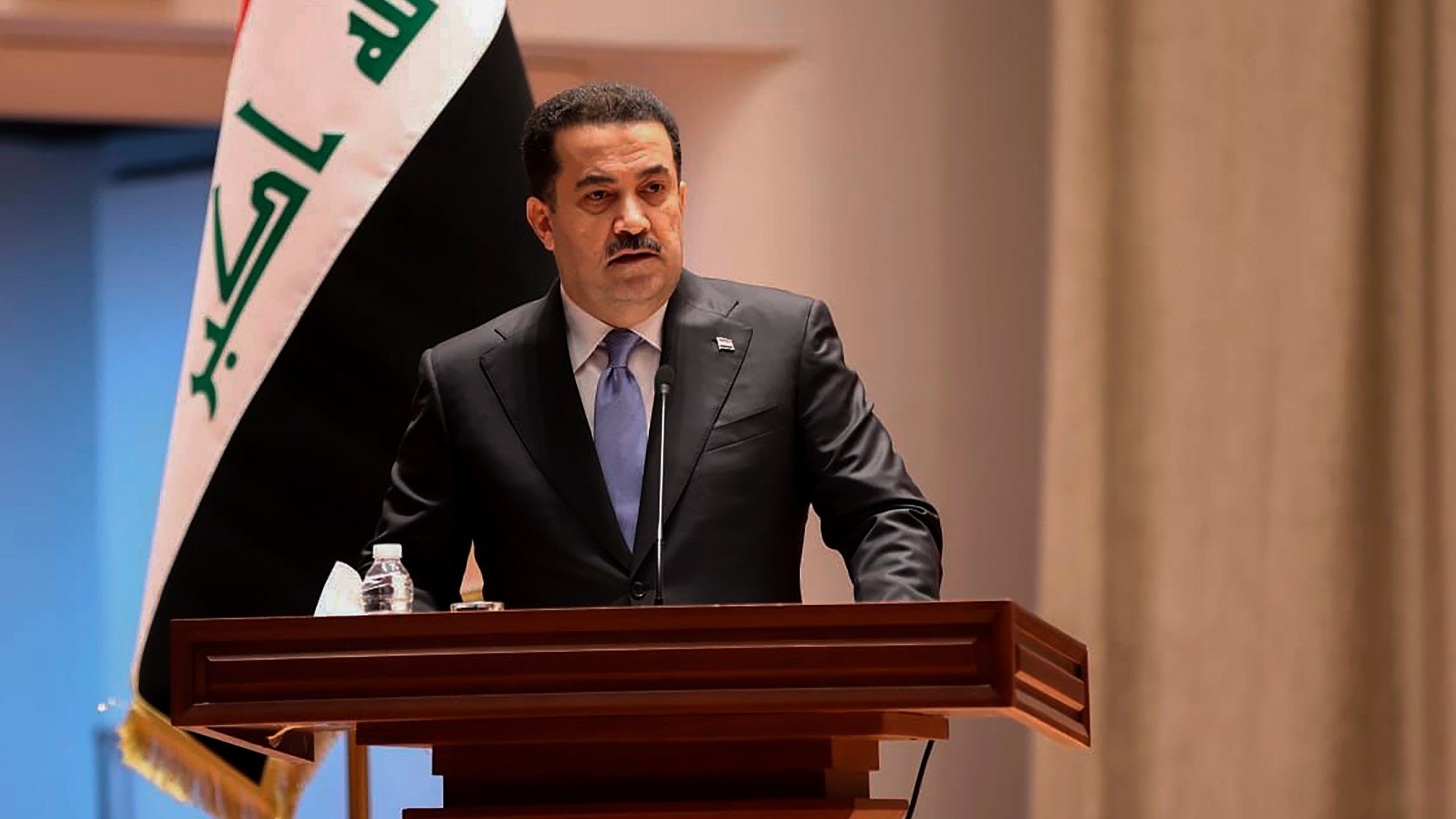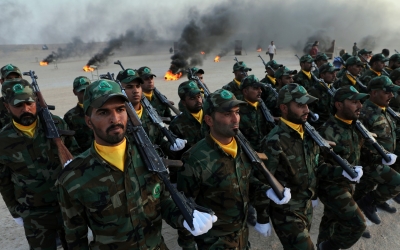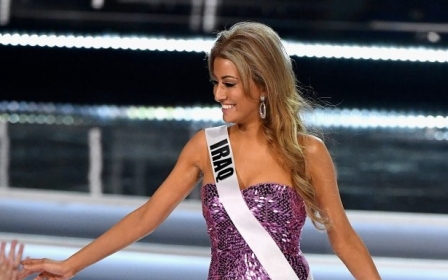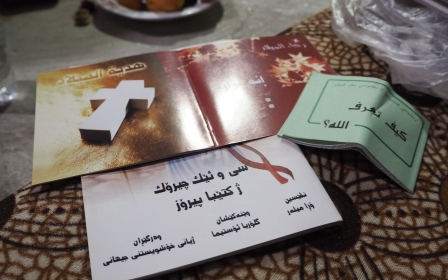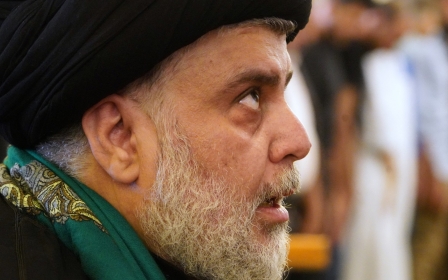Iraq: Row over the Hashd al-Shaabi reveals cracks in the pro-Iran coalition
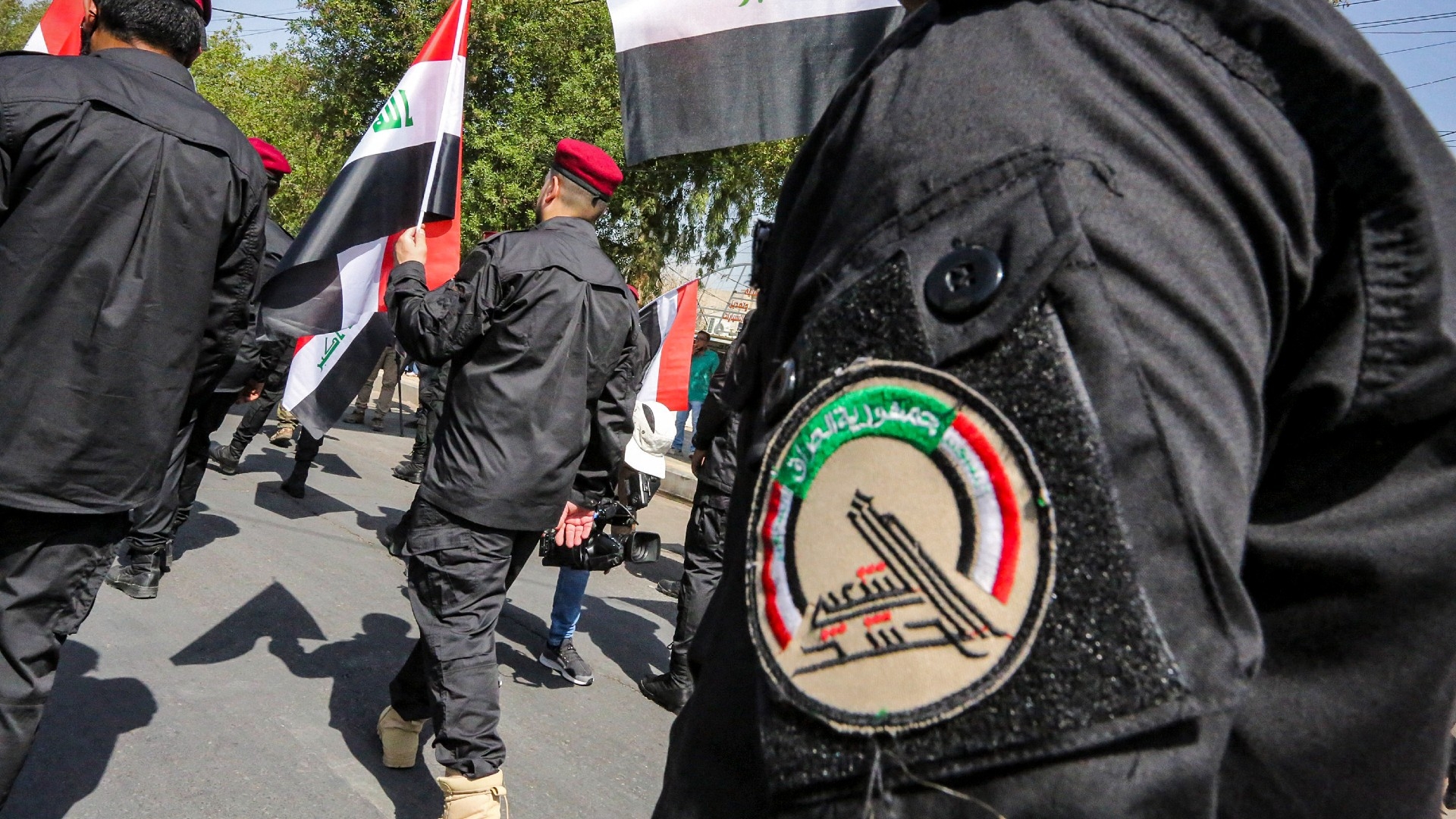
None of the leaders of the Iraqi armed factions ever took Falih al-Fayyadh's statements seriously.
The head of the Popular Mobilisation Authority (PMA) paramilitary umbrella organisation is far from known for issuing embarrassing public challenges. He tends to solve problems through the quiet consensus-building of a tribal leader rather than an influential official or commander of the third-largest combat force in Iraq.
So his fiery and confrontational public broadside last month took everyone by surprise.
At a security conference at the PMA's Mosul headquarters on 20 May, Fayyadh declared that the Popular Mobilisation (known as Hashd al-Shaabi in Arabic) needed to be rooted in law and subject to the same military regulations as other elements of the security services.
He said the Hashd al-Shaabi is in the process of being separated from the armed factions that make up the backbone of its forces.
New MEE newsletter: Jerusalem Dispatch
Sign up to get the latest insights and analysis on Israel-Palestine, alongside Turkey Unpacked and other MEE newsletters
"Prime Minister Mohammed Shia al-Sudani is the supreme commander of the Popular Mobilisation Forces and all the armed forces… We obey his orders," Fayyadh said.
"The Popular Mobilisation Forces are a jihadi military and security formation, yes, but they are under a legitimate, elected government. They have nothing but obedience and comply with the orders of the commander-in-chief of the armed forces."
If his statements were surprising, so too was the silence that greeted them, as the expected angry reactions from the heads of armed factions and other Shia leaders never materialised.
Odder still was that Fayyadh's speech in Mosul was followed by an order to the Hashd al-Shaabi to cancel the annual parade celebrating the anniversary of its founding later this month.
The order, which came from Fayyadh personally, included cancelling a military manoeuvre set to be held in western Mosul to mark the occasion as well.
"Everyone has been informed that the lack of funds and new units or weapons worthy of display are the reason for cancelling the military parade," a senior PMA commander told Middle East Eye.
"We all know that this is not true and that the issue is not related to cost or weapons."
The commander described the annual parade as "a show of strength in front of friends and foes".
"Cancelling it under flimsy and incorrect pretexts will affect the morale of the fighters," he said. "The cost does not exceed $3m, and as for weapons, we have a lot to show off."
The commander said that the Hashd al-Shaabi forces have recently obtained new armoured vehicles, drones and Russian weapons (including, he claimed, the S-400 anti-aircraft system), as well as many other arms, and that they were willing to show them in that parade.
"So, it has nothing to do with the cost or the availability of weapons," he said.
A few days after the Mosul conference, Fayyadh intimated to his commanders that he wanted them to reduce celebrations for the anniversary and avoid media appearances.
It's certainly a confusing picture, and has questions being asked about what is going on in the PMA.
Are these developments the result of conflict between Fayyadh and leaders of the armed factions over his position? Or is it evidence that the Hashd al-Shaabi is indeed going through its "second stage of establishment" - as Fayyadh described regularising the force.
'The Popular Mobilisation Forces are a jihadi military and security formation, yes, but they are under a legitimate, elected government'
- Falih al-Fayyadh
What is certain is that all signs indicate fundamental changes in the tactics of the Shia forces loyal to Iran, which will have an impact on Iraqi politics and redraw the map of influence among Shia parties.
Iraqi political leaders told MEE that the process began immediately after influential Shia cleric Muqtada al-Sadr withdrew from politics in August, allowing his Iran-backed Shia rivals in the Coordination Framework political alliance to form a government.
The Coordination Framework casts itself as the unified front of Iraq's Shia forces. But Fayyadh's speech clearly revealed this post-Sadr unity is fragile, with the coalition's various parties conflicting soon after their rival Sadr was marginalised.
"All the forces of the Coordination Framework saw Sadr as their arch-enemy, for whom they had to abandon their internal differences and unite to confront him," a senior Shia political leader told MEE.
"Sadr's withdrawal brought them back to their old differences and their fierce competition for gains. What is happening in the PMA is only one of the manifestations of this scramble and an essential part of it," he added.
"The conflict will certainly not be bloody this time, but it will be a fierce stampede, and it will not abate until everyone settles in their new positions on the political map."
Scramble for gains
The PMA is a governmental umbrella established in June 2014 to oversee civilians and armed factions that volunteered to fight the Islamic State group (IS) alongside the Iraqi government.
Iranian-backed Shia armed factions such as the Badr Organisation, Asaib Ahl al-Haq and Kataeb Hezbollah represent the backbone of the Hashd al-Shaabi forces and played a pivotal role in defeating IS.
The loyalty of the Hashd forces, which now includes 40 brigades and more than 230,000 fighters, are divided between three men: Grand Ayatollah Sayyid Ali al-Sistani, the head of the Shia community in Iraq, Sadr and Iranian Supreme Leader Ali Khamenei.
Despite these split loyalties, the head of the PMA enjoys very large financial and administrative powers, regardless of his affiliation.
Whoever occupies this post has access to hundreds of millions of dollars and tens of thousands of electoral votes, in addition to influence across Iraq and other countries - which can be used for both legal and illegal means.
This made the position a "great and mouthwatering target" for all political forces and armed factions, whether affiliated with Iran or not, officials told MEE.
Fayyadh's rivals have long coveted his job, and in December efforts to remove him fell apart when Iranian-backed Shia forces were unable to agree on an alternative PMA leader.
After surviving the plot, Fayyadh flew to Iran seeking an audience with Khamenei to "complain to him about what the faction leaders are doing with him and their attempts to overthrow him", one of the PMA's senior commanders told MEE.
Fayyadh was not able to meet Khamenei personally, so he left a written note asking about his position and the attempts to usurp him.
The answer that Fayyadh received in January, the commander said, stated Khamenei's "unconditional support for Fayyadh".
"The message was clear and unambiguous: separate the armed factions from the forces of the PMA, strengthen the PMA and link it to the state apparatus," the commander said.
"Since then, [the leaders of the armed factions] keep silent."
It is clear that Khamenei's message temporarily stopped the machinations of the leaders of the Badr Organisation, Asaib Ahl al-Haq and Kataeb Hezbollah, which for years have wanted to have Fayyadh's position and the office of the Hashd's chief of staff. But it did not end the dispute.
The commanders of the Asaib Ahl al-Haq and Kataeb Hezbollah brigades in the Hashd have refused to attend any meetings chaired by Fayyadh for six months, PMA commanders told MEE.
Not only that, but Fayyadh, who is considered one of the founders of the Coordination Framework and the head of one of its political forces, has been excluded from the meetings of the ruling political coalition since November, and his political representative has also been prevented from attending these meetings recently, a Framework leader told MEE.
In response, Fayyadh found no choice but to "agree" to Prime Minister Mohammed Shia al-Sudani's proposals to bring the PMA closer to the state "and therefore give himself greater control over the Hashd's units and activities", one of Sudani's advisers told MEE.
The adviser did not deny that this lay behind the decision to cancel the Hashd's parade, calling the decision a "cadeau" presented by Sudani to the Americans "as a goodwill gesture".
"In fact, the Americans are fully supporting us now, especially the White House, and we do not need to provoke them for any reason," the adviser said.
"Keeping Fayyadh in his position serves us greatly at this stage, as the man is weak and responds to what we ask of him in exchange for remaining in the position," he added. "Gradually, he will help us undermine the influence of the factions and strengthen the centralisation of the PMA, and this is exactly what we are currently seeking."
The untouchable brigades
In his Mosul speech, Fayyadh said that the PMA leadership is in the process of reforming the authority's structure "in accordance with the law".
He did not provide further details about the nature of the new structure or the mechanisms for achieving it, but PMA commanders told MEE that a number of attached military directorates and formations would be merged, created or abolished, and that many commanders would be replaced.
"Some of the commanders of brigades, regiments and operations who will be affected by the change are those who refuse to respond to Fayyadh's orders," a PMA commander told MEE.
"The plan is to put the forces entirely under the command of the government. This is a message addressed to the international community and the supreme religious authority in Najaf," he added, referring to Sistani.
"Fayyadh has been playing a game much bigger than he is."
Restructuring and regularising the Hashd's forces is part of the security sector reform programme that Sudani and his government have been working on for months, sources told MEE.
Despite the apparent support of all political blocs for Sudani's efforts in this regard, it is not clear now to what extent Sudani and Fayyadh will be allowed to proceed with their plan to restructure the PMA and gain greater control over its forces and resources.
However, everyone inside and outside the government expects that violent clashes will break out with the forces who see these developments as a threat to them and their interests.
"Fayyadh can say whatever he wants. We do not object to the Popular Mobilisation Forces submitting to the orders of the commander-in-chief of the armed forces, but not all orders," a Kataeb Hezbollah commander told MEE.
"There are eight brigades within the PMA which represent the Islamic resistance. Neither Fayyadh nor his father can touch them, their salaries or their equipment. Other than that, he can do whatever he wants away from us."
Middle East Eye delivers independent and unrivalled coverage and analysis of the Middle East, North Africa and beyond. To learn more about republishing this content and the associated fees, please fill out this form. More about MEE can be found here.


